Yufeng Wu
"I'm happy even though it's not real": GenAI Photo Editing as a Remembering Experience
Feb 03, 2026Abstract:Generative Artificial Intelligence (GenAI) is increasingly integrated into photo applications on personal devices, making editing photographs easier than ever while potentially influencing the memories they represent. This study explores how and why people use GenAI to edit personal photos and how this shapes their remembering experience. We conducted a two-phase qualitative study with 12 participants: a photo editing session using a GenAI tool guided by the Remembering Experience (RX) dimensions, followed by semi-structured interviews where participants reflected on the editing process and results. Findings show that participants prioritised felt memory over factual accuracy. For different photo elements, environments were modified easily, however, editing was deemed unacceptable if it touched upon a person's identity. Editing processes brought positive and negative impacts, and itself also became a remembering experience. We further discuss potential benefits and risks of GenAI editing for remembering purposes and propose design implications for responsible GenAI.
NiMark: A Non-intrusive Watermarking Framework against Screen-shooting Attacks
Jan 17, 2026Abstract:Unauthorized screen-shooting poses a critical data leakage risk. Resisting screen-shooting attacks typically requires high-strength watermark embedding, inevitably degrading the cover image. To resolve the robustness-fidelity conflict, non-intrusive watermarking has emerged as a solution by constructing logical verification keys without altering the original content. However, existing non-intrusive schemes lack the capacity to withstand screen-shooting noise. While deep learning offers a potential remedy, we observe that directly applying it leads to a previously underexplored failure mode, the Structural Shortcut: networks tend to learn trivial identity mappings and neglect the image-watermark binding. Furthermore, even when logical binding is enforced, standard training strategies cannot fully bridge the noise gap, yielding suboptimal robustness against physical distortions. In this paper, we propose NiMark, an end-to-end framework addressing these challenges. First, to eliminate the structural shortcut, we introduce the Sigmoid-Gated XOR (SG-XOR) estimator to enable gradient propagation for the logical operation, effectively enforcing rigid image-watermark binding. Second, to overcome the robustness bottleneck, we devise a two-stage training strategy integrating a restorer to bridge the domain gap caused by screen-shooting noise. Experiments demonstrate that NiMark consistently outperforms representative state-of-the-art methods against both digital attacks and screen-shooting noise, while maintaining zero visual distortion.
DDNet: A Dual-Stream Graph Learning and Disentanglement Framework for Temporal Forgery Localization
Jan 05, 2026Abstract:The rapid evolution of AIGC technology enables misleading viewers by tampering mere small segments within a video, rendering video-level detection inaccurate and unpersuasive. Consequently, temporal forgery localization (TFL), which aims to precisely pinpoint tampered segments, becomes critical. However, existing methods are often constrained by \emph{local view}, failing to capture global anomalies. To address this, we propose a \underline{d}ual-stream graph learning and \underline{d}isentanglement framework for temporal forgery localization (DDNet). By coordinating a \emph{Temporal Distance Stream} for local artifacts and a \emph{Semantic Content Stream} for long-range connections, DDNet prevents global cues from being drowned out by local smoothness. Furthermore, we introduce Trace Disentanglement and Adaptation (TDA) to isolate generic forgery fingerprints, alongside Cross-Level Feature Embedding (CLFE) to construct a robust feature foundation via deep fusion of hierarchical features. Experiments on ForgeryNet and TVIL benchmarks demonstrate that our method outperforms state-of-the-art approaches by approximately 9\% in AP@0.95, with significant improvements in cross-domain robustness.
Sim-to-Real: An Unsupervised Noise Layer for Screen-Camera Watermarking Robustness
Apr 26, 2025Abstract:Unauthorized screen capturing and dissemination pose severe security threats such as data leakage and information theft. Several studies propose robust watermarking methods to track the copyright of Screen-Camera (SC) images, facilitating post-hoc certification against infringement. These techniques typically employ heuristic mathematical modeling or supervised neural network fitting as the noise layer, to enhance watermarking robustness against SC. However, both strategies cannot fundamentally achieve an effective approximation of SC noise. Mathematical simulation suffers from biased approximations due to the incomplete decomposition of the noise and the absence of interdependence among the noise components. Supervised networks require paired data to train the noise-fitting model, and it is difficult for the model to learn all the features of the noise. To address the above issues, we propose Simulation-to-Real (S2R). Specifically, an unsupervised noise layer employs unpaired data to learn the discrepancy between the modeling simulated noise distribution and the real-world SC noise distribution, rather than directly learning the mapping from sharp images to real-world images. Learning this transformation from simulation to reality is inherently simpler, as it primarily involves bridging the gap in noise distributions, instead of the complex task of reconstructing fine-grained image details. Extensive experimental results validate the efficacy of the proposed method, demonstrating superior watermark robustness and generalization compared to those of state-of-the-art methods.
UnPuzzle: A Unified Framework for Pathology Image Analysis
Mar 05, 2025Abstract:Pathology image analysis plays a pivotal role in medical diagnosis, with deep learning techniques significantly advancing diagnostic accuracy and research. While numerous studies have been conducted to address specific pathological tasks, the lack of standardization in pre-processing methods and model/database architectures complicates fair comparisons across different approaches. This highlights the need for a unified pipeline and comprehensive benchmarks to enable consistent evaluation and accelerate research progress. In this paper, we present UnPuzzle, a novel and unified framework for pathological AI research that covers a broad range of pathology tasks with benchmark results. From high-level to low-level, upstream to downstream tasks, UnPuzzle offers a modular pipeline that encompasses data pre-processing, model composition,taskconfiguration,andexperimentconduction.Specifically, it facilitates efficient benchmarking for both Whole Slide Images (WSIs) and Region of Interest (ROI) tasks. Moreover, the framework supports variouslearningparadigms,includingself-supervisedlearning,multi-task learning,andmulti-modallearning,enablingcomprehensivedevelopment of pathology AI models. Through extensive benchmarking across multiple datasets, we demonstrate the effectiveness of UnPuzzle in streamlining pathology AI research and promoting reproducibility. We envision UnPuzzle as a cornerstone for future advancements in pathology AI, providing a more accessible, transparent, and standardized approach to model evaluation. The UnPuzzle repository is publicly available at https://github.com/Puzzle-AI/UnPuzzle.
Network Causal Effect Estimation In Graphical Models Of Contagion And Latent Confounding
Nov 02, 2024Abstract:A key question in many network studies is whether the observed correlations between units are primarily due to contagion or latent confounding. Here, we study this question using a segregated graph (Shpitser, 2015) representation of these mechanisms, and examine how uncertainty about the true underlying mechanism impacts downstream computation of network causal effects, particularly under full interference -- settings where we only have a single realization of a network and each unit may depend on any other unit in the network. Under certain assumptions about asymptotic growth of the network, we derive likelihood ratio tests that can be used to identify whether different sets of variables -- confounders, treatments, and outcomes -- across units exhibit dependence due to contagion or latent confounding. We then propose network causal effect estimation strategies that provide unbiased and consistent estimates if the dependence mechanisms are either known or correctly inferred using our proposed tests. Together, the proposed methods allow network effect estimation in a wider range of full interference scenarios that have not been considered in prior work. We evaluate the effectiveness of our methods with synthetic data and the validity of our assumptions using real-world networks.
Zero-shot Class Unlearning via Layer-wise Relevance Analysis and Neuronal Path Perturbation
Oct 31, 2024Abstract:In the rapid advancement of artificial intelligence, privacy protection has become crucial, giving rise to machine unlearning. Machine unlearning is a technique that removes specific data influences from trained models without the need for extensive retraining. However, it faces several key challenges, including accurately implementing unlearning, ensuring privacy protection during the unlearning process, and achieving effective unlearning without significantly compromising model performance. This paper presents a novel approach to machine unlearning by employing Layer-wise Relevance Analysis and Neuronal Path Perturbation. We address three primary challenges: the lack of detailed unlearning principles, privacy guarantees in zero-shot unlearning scenario, and the balance between unlearning effectiveness and model utility. Our method balances machine unlearning performance and model utility by identifying and perturbing highly relevant neurons, thereby achieving effective unlearning. By using data not present in the original training set during the unlearning process, we satisfy the zero-shot unlearning scenario and ensure robust privacy protection. Experimental results demonstrate that our approach effectively removes targeted data from the target unlearning model while maintaining the model's utility, offering a practical solution for privacy-preserving machine learning.
Stochastic Dynamic Power Dispatch with High Generalization and Few-Shot Adaption via Contextual Meta Graph Reinforcement Learning
Jan 19, 2024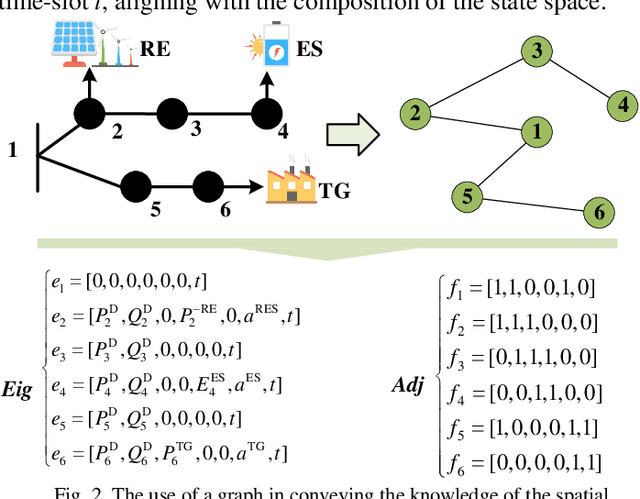
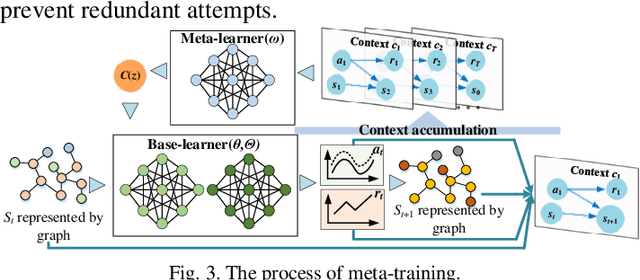
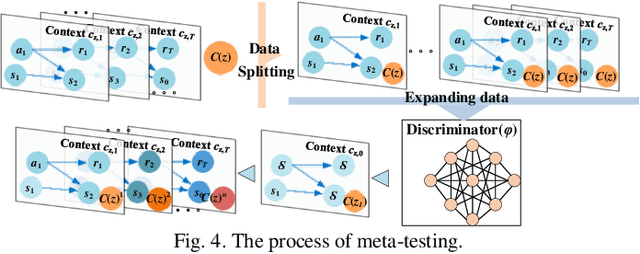
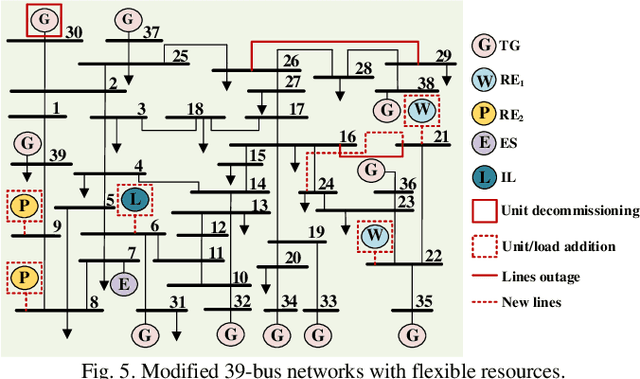
Abstract:Reinforcement learning is an emerging approaches to facilitate multi-stage sequential decision-making problems. This paper studies a real-time multi-stage stochastic power dispatch considering multivariate uncertainties. Current researches suffer from low generalization and practicality, that is, the learned dispatch policy can only handle a specific dispatch scenario, its performance degrades significantly if actual samples and training samples are inconsistent. To fill these gaps, a novel contextual meta graph reinforcement learning (Meta-GRL) for a highly generalized multi-stage optimal dispatch policy is proposed. Specifically, a more general contextual Markov decision process (MDP) and scalable graph representation are introduced to achieve a more generalized multi-stage stochastic power dispatch modeling. An upper meta-learner is proposed to encode context for different dispatch scenarios and learn how to achieve dispatch task identification while the lower policy learner learns context-specified dispatch policy. After sufficient offline learning, this approach can rapidly adapt to unseen and undefined scenarios with only a few updations of the hypothesis judgments generated by the meta-learner. Numerical comparisons with state-of-the-art policies and traditional reinforcement learning verify the optimality, efficiency, adaptability, and scalability of the proposed Meta-GRL.
Exploration of Adolescent Depression Risk Prediction Based on Census Surveys and General Life Issues
Jan 06, 2024Abstract:In contemporary society, the escalating pressures of life and work have propelled psychological disorders to the forefront of modern health concerns, an issue that has been further accentuated by the COVID-19 pandemic. The prevalence of depression among adolescents is steadily increasing, and traditional diagnostic methods, which rely on scales or interviews, prove particularly inadequate for detecting depression in young people. Addressing these challenges, numerous AI-based methods for assisting in the diagnosis of mental health issues have emerged. However, most of these methods center around fundamental issues with scales or use multimodal approaches like facial expression recognition. Diagnosis of depression risk based on everyday habits and behaviors has been limited to small-scale qualitative studies. Our research leverages adolescent census data to predict depression risk, focusing on children's experiences with depression and their daily life situations. We introduced a method for managing severely imbalanced high-dimensional data and an adaptive predictive approach tailored to data structure characteristics. Furthermore, we proposed a cloud-based architecture for automatic online learning and data updates. This study utilized publicly available NSCH youth census data from 2020 to 2022, encompassing nearly 150,000 data entries. We conducted basic data analyses and predictive experiments, demonstrating significant performance improvements over standard machine learning and deep learning algorithms. This affirmed our data processing method's broad applicability in handling imbalanced medical data. Diverging from typical predictive method research, our study presents a comprehensive architectural solution, considering a wider array of user needs.
Learning and Inference on Generative Adversarial Quantum Circuits
Aug 10, 2018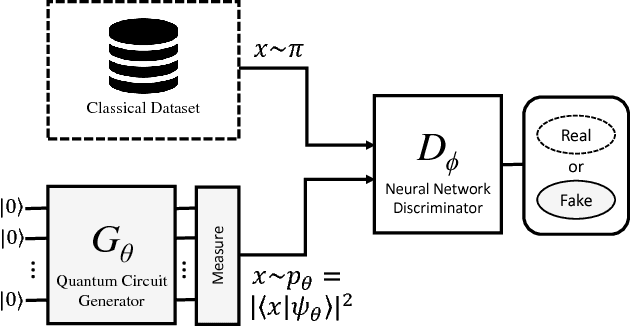
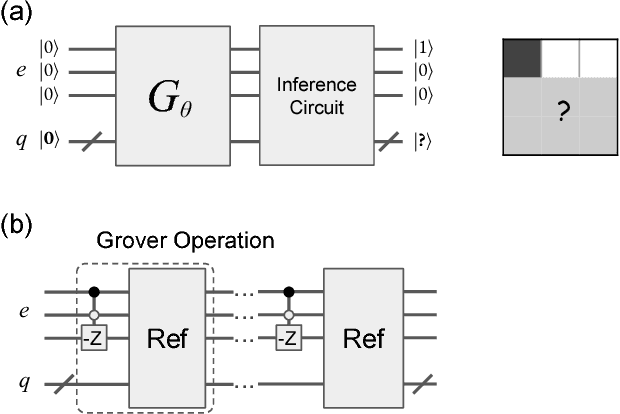
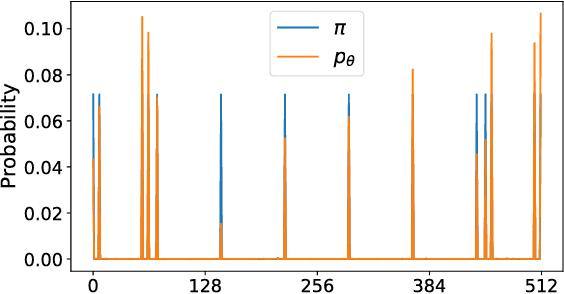
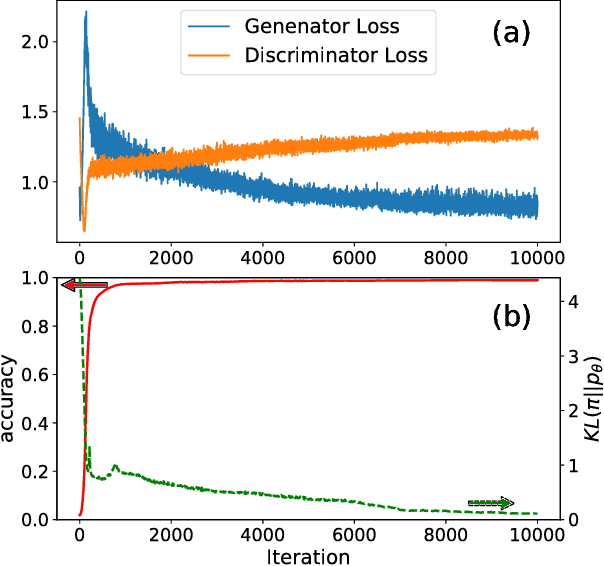
Abstract:Quantum mechanics is inherently probabilistic in light of Born's rule. Using quantum circuits as probabilistic generative models for classical data exploits their superior expressibility and efficient direct sampling ability. However, training of quantum circuits can be more challenging compared to classical neural networks due to lack of efficient differentiable learning algorithm. We devise an adversarial quantum-classical hybrid training scheme via coupling a quantum circuit generator and a classical neural network discriminator together. After training, the quantum circuit generative model can infer missing data with quadratic speed up via amplitude amplification. We numerically simulate the learning and inference of generative adversarial quantum circuit using the prototypical Bars-and-Stripes dataset. Generative adversarial quantum circuits is a fresh approach to machine learning which may enjoy the practically useful quantum advantage on near-term quantum devices.
 Add to Chrome
Add to Chrome Add to Firefox
Add to Firefox Add to Edge
Add to Edge